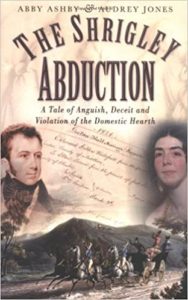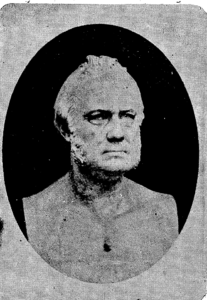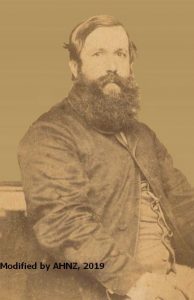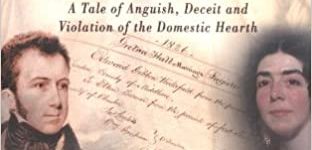1827: The Trial of the Wakefields
March 22, 2021
By AHNZ
 Today in history, 23 March, 1827, at the court at Lancaster Castle a judgement was made which was to have very far-reaching consequences to the history of New Zealand. The Wakefields, of course, made a family business of colonising our islands and are directly responsible for the establishment of the Wellington, Nelson and Canterbury settlements. What experiences formed these personalities? Why were they before a judge?
Today in history, 23 March, 1827, at the court at Lancaster Castle a judgement was made which was to have very far-reaching consequences to the history of New Zealand. The Wakefields, of course, made a family business of colonising our islands and are directly responsible for the establishment of the Wellington, Nelson and Canterbury settlements. What experiences formed these personalities? Why were they before a judge?
The Shrigley Abduction
It had been an attempt to vault up the ladder of political power by one of the most risky yet recognised power moves: Abducting a powerful man’s daughter and marrying her behind his back. A young lady, Ellen Turner, was selected to be married to Edward Gibbon Wakefield who, with his brothers assistance, set about enacting the plot. They counted on Turner’s father to submit in order to save face. They counted wrong.
William Turner, High Sheriff of Cheshire, had two options. One was to suffer the embarrassment of having a run-away daughter whose virtue had been stolen and fight to get her back from the kidnappers. This would be an expensive public scandal and endanger Ellen’s reputation as a proper and chaste young lady. She would be damaged goods in the eyes of the bourgeoisie. Option two, and this was the one the Wakefield’s bet on, was that Turner would let the entire thing slide and agree it was all very romantic and bless the marriage. The path of least resistance.
William, Edward, and Frances Wakefield were put on trial. Frances, the mens’ step-mother, was the real hand behind the plot yet got away without sentence in May. However, William and Edward are sentenced to 3 years in prison. All found guilty of forced-marriage, young Ellen Turner to Edward. Because Turner did not behave as predicted the plan of the Wakefields and their reputations were shot to hell except…..on the wild frontiers of the colonies.
Prison Time
 Edward Gibbon Wakefield (image left) played to his fellow prisoners for their attention and affection. As he had also done at school, Edward played to his peers and became the center of attention. He looked out for the welfare of others, he became everyone’s pal, the most popular guy in prison. This might have made Wakefield a prison reformer, like John Howard, but instead of that the similar energy was put toward thinking about transportation to the colonies and colonisation itself. It was here, in prison, that he wrote his famous Letter from Sydney.
Edward Gibbon Wakefield (image left) played to his fellow prisoners for their attention and affection. As he had also done at school, Edward played to his peers and became the center of attention. He looked out for the welfare of others, he became everyone’s pal, the most popular guy in prison. This might have made Wakefield a prison reformer, like John Howard, but instead of that the similar energy was put toward thinking about transportation to the colonies and colonisation itself. It was here, in prison, that he wrote his famous Letter from Sydney.
His famous A Letter from Sydney (where he had never been) was actually written in 1829 while EGW was in prison for kidnapping! Nevertheless, it’s a good bit of colonisation economic writing that even Karl Marx himself appreciated. – AHNZ
Wekefield’s thinking developed to the point where EGW became one of the great economists and the key man who determines that New Zealand will be colonised and how it will be colonised.
Wild Frontiers of the Colonies
 EGW was one of the first NZ Members of Parliament and very nearly the first Prime Minister. However, after all that leg work of creating a new country and central government to be a Boss in because he’d blown his shot in the Old Country, EGW failed to make the transition from builder to politician. His faction, Wakefieldites, became despised and were ousted from influence in 1854. Later that same year, EGW was cut down while travelling home into a cold southerly at 2am after giving a political speech. The resulting rheumatic fever essentially killed the man, though he did not die until 1862.
EGW was one of the first NZ Members of Parliament and very nearly the first Prime Minister. However, after all that leg work of creating a new country and central government to be a Boss in because he’d blown his shot in the Old Country, EGW failed to make the transition from builder to politician. His faction, Wakefieldites, became despised and were ousted from influence in 1854. Later that same year, EGW was cut down while travelling home into a cold southerly at 2am after giving a political speech. The resulting rheumatic fever essentially killed the man, though he did not die until 1862.
EGW’s son, Jerningham (image right,) misspent his youth as a ‘bad boy’ in New Zealand. He then moved on to become a useful tool, a puppet politician, manipulated quite literally by alcohol and strings. He died poorly.
Brother, William Wakefield, was founder and leader of the early settlement of Wellington. It was he who raced across the world against Captain William Hobson in 1839, beating him to NZ. The two Williams, NZ Company vs British Crown, vied for who was going to run the place. William’s daughter married the true first premier of New Zealand, Edward Stafford¹.
Younger brother, Captain Arther Wakefield, who was not caught up in this scandal, also became a key man and martyr to coloniation when he was murdered at the Wairau Affray.
Had things gone differently and the Wakefields been the ones to write this history books, why, they’d be some kind of Founding Fathers to us. Virtually a Royal Family. No need to feel badly for them though. They had a lot of effort but not a lot of virtue.
—
1 Stafford was the first Prime Miniser/Premier in the sense that the previous men were only pretenders though, technically, the first. State history says this dishonor goes to Sewell but if you’re going to look at it that way it ought to be Fitzgerald…; Ref. 1854: New Zealand’s First Prime Minister?
Image ref. cover of The Shrigley Abduction (2003)
2 thoughts on "1827: The Trial of the Wakefields"
Leave a Reply
 Like Comment Share
Like Comment Share






Great delving into areas of history that I have not been and probably wouldn’t otherwise go.
Keep up the good work!
Very welcome, appreciate your comments.